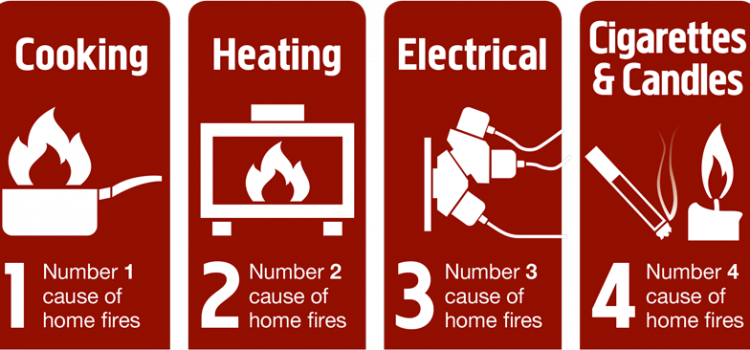

1) Cooking Accidents
The leading cause of home fires and related injuries is home-cooking equipment. Cooking related accidents is one of the top causes of house fires. Most often they are the result of hot oil or grease igniting. Cooking oils and those coming from animal fats are very flammable when they get hot enough. When their temperature reaches around 600°F, they can spontaneously erupt into flame. Once they start burning. they are very difficult to put out. The best way is to have a fire extinguisher nearby or throw flour or baking soda onto the fire. If the fire is small enough, snuff it by covering it with a lid and turn down the burner. Never use water; that will only make the grease explode and throw hot oil and fire all over the kitchen and you.
2) Heating Appliances
Electric baseboard heaters and space heaters can cause a fire when fabrics and other combustibles are too close to them. Heaters that require fuel such as kerosene or propane are especially dangerous because what fuels them is flammable and under pressure in a tank. If not monitored, they can explode or ignite. Electrical heaters with frayed wires or faulty coils can lead to a fire in addition to them igniting drapes or other nearby fabric materials. Always read the owner’s manual and instructions when using a space heater and inspect it to make sure it’s working properly. To avoid tragedy altogether, never leave the house with a heater running. Give space heaters space.
3) Electrical Fires
Electrical fires are one of the more avoidable kinds of house fires. If a licensed electrician follows the established building codes and procedures for wiring a home, then there should be no problems. However, electrical fires account for 51,000 fires every year. Most electrical fires are attributable to short circuits causing arcing that ignites nearby building materials, most notably wooden studs. Circuits overloaded with electrical current heating wires are the other leading cause. These kinds of fires occur in places that homeowners can’t easily see; down in the basement, under a staircase, or in walls. Because they don’t see these areas, the
homeowner has no idea there is a fire until it’s too late.
4) Smoking
Not only is smoking hazardous to your health but to your home and family’s health. Being careless with a cigarette, cigar or other smoking materials is a good way to burn your house down. A cigarette butt dropped on carpet, furniture or other flammable materials can quickly ignite a home. You should avoid smoking in bed at all costs. For example, imagine lying in bed with a cigarette in your fingers and then falling asleep. That cigarette will continue to burn after you fall asleep and possibly ignite your mattress, sheets, pajamas, or all three. Always extinguish any smoking materials fully in an ashtray or under running water so they cannot start a fire.
5) Candles
Candles are beautiful, fragrant. and add wonderful light and ambiance to any room. They can set the mood on a romantic night, mask a musty smell, or provide light when the power goes out. But candles are a fire risk if left unattended—especially if children and pets are around. Keep candles at least a foot away from anything flammable such as a Christmas tree or curtains and extinguish them when you leave the room if small kids or pets are there. Don’t put a lit candle on any surface that isn’t stable or can easily topple over. A candle is an open flame and can ignite anything simply by meeting it
6) Chemical Fires
Chemical fires are more common in industrial or business settings, but they can also happen in the home. Most homes have a collection of cleaning supplies, paints, stains, and other flammable liquids that can cause a fire. Certain chemicals, on their own, only pose a risk if you were to ingest them, however, combined with another chemical, they can become explosive and cause fires. Many chemical fires in the home are a result of gas vapors reaching a flashpoint or meeting a heat source. As such, you should store fuels and other flammable chemicals in approved containers and protect them from excessive heat
7) Kids Playing with Fire
Kids are naturally curious and want to explore, touch, and handle everything they see. Fire is irresistible to kids and they don’t know how dangerous it is or how to handle it. Matches, lighters, and candles, when in the hands of a child, can burn down a house in minutes. Keep all lighters and matches in a drawer or out of reach and extinguish candles when leaving a room Kids don’t start fires on purpose—they do it when adults are careless.
Please contact the Safer Escape team for a price quote, or call (725) 2ESCAPE (237-2273).
